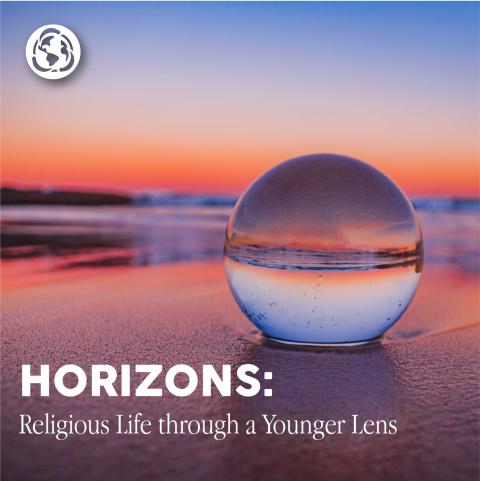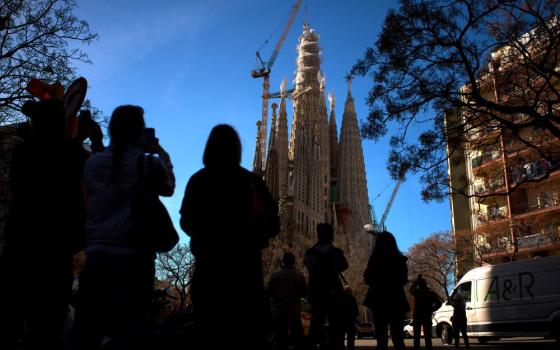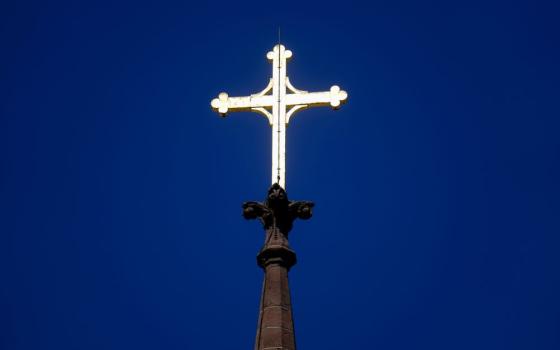An Augustinian nun from the Monastery of the Conversion playing the shofar at the beginning of the oratorio in Sotillo de la Adrada, Spain. (Courtesy of the Monastery of the Conversion)

Symbols carry an explanatory power that transcends reason alone. More than that, they can exert a transformative effect on some people. A symbol can change our lives — it allows us to see what we couldn't see, to live what we couldn't reach on our own. It gives us strength and light, opening paths we never imagined.
I was reminded of this the other afternoon, when the small church in my monastery filled with spectators — most of them not consecrated religious — who had come to experience an oratorio. That is, a form of sacred music presented as a concert that tells a story with spiritual meaning.
"Over a year ago, I was sitting with Mother Carolina and Mother Prado on the wall that surrounds the monastery's cross, talking about how we might tell this love story," explained Marcelo Bronzetti, composer of the oratorio "El Santo Viaje" ("The Holy Journey"), as he introduced the performance. Since discovering our contemplative life, Marcelo has been convinced that our vocation — and the journey that led to the founding of our community — is a true love story between God and us, one that deserves to be told to many.
The structure was simple: the oratorio featured nine songs, tied together by a narrative thread read aloud by a narrator. The songs told the story of the foundation of our community while also conveying the essential points of our charism and way of life. It was performed by a choir of friends who, though amateur musicians, are true artists. Marcelo composed and played the piano, and his wife Tina — physician, violinist, mother and grandmother — was among the musicians.
'We contemplative sisters are a symbol — not only pointing to the proper place within the human heart, but also opening a unique space in which to recognize it, cleave to it, and taste the fullness that entirely corresponds to our desire.': Sr. Begoña Costillo
The audience waited in silence for the oratorio to begin. One of my sisters stepped to the center of the stage and, blowing a ram's horn, produced a sound that seemed to come from ancient times. It was a shofar, an instrument from ancient Jewish liturgy used — among other things — to awaken human beings from spiritual lethargy and draw them inward, to that inner place where they can hear the voice of God.
That ancient sound was followed by a magnificent opening line: "In a distant time, the Voice of the Shofar called her by name: she rose and discovered that the Universe was not before her eyes but all around her being …"
These words referred to the call experienced by our community's foundress. Yet the audience, in some inexplicable way, could feel that same echo resonating at the center of their own lives. To hear our own name spoken deep in our hearts, to know ourselves called, seen, chosen; to touch the vastness of the universe and feel part of it — these are experiences that speak to a thirst we all share, even when the busyness and distractions of life make us forget.
From that moment on, the oratorio became a mirror for anyone willing to enter into its essential meaning. It didn't just tell our particular story; it offered each person the chance to see reflected their own interior journey — their origin and destination, and the unique, mysterious path that connects the two. To perceive it, one needed to obey the voice of the Shofar, which in the first song proclaimed: "Awake, you who sleep in the night with no dawn or refuge from that Solitude within you that longs for Love."
The oratorio as a whole was an expression of the restlessness of the human heart. That's why the story became a symbol — a bridge to the lives of those who listened. Whether monastic or not, married or single, young or old, each person in this world bears in their DNA the image of their Creator — and with it, the unshakable desire to live in his presence, to see him, and to enter into relationship with him.
It was easy, then, for audience members to feel personally addressed by the progression of the work, which described how the time of our lives is a "journey toward the Promised Land," a path along which we need the guidance of a star: "She will reveal your name; follow her — she shows the way." And at the end of the road, each person might be able to say, as the lead soloist sang: "I will run to you, with all my wounds, feet worn from all my sins; but I know you've been waiting for me, and you will embrace me as I never imagined."
Advertisement
This is the secret behind the awe and joy experienced by those who spend time at the monastery and share in our life. We do nothing more than live intensely the essential meaning of human existence.
Their vocations may differ from ours, but when visitors encounter silence, the beauty of music in the liturgy, the embrace of nature, the warmth of fraternity, or the simplicity of our manual work, they are touched by a truth that belongs to them, too: that they are made to live in that essential space. That beyond all the things that fill their time and effort in daily life, there is an unconditional, infinite Presence that gives meaning and substance to everything — because his love is the all for which we thirst.
That's why we often witness how, after just a few days in the monastery, people return home with a new face, a new spirit — walking confidently in the embrace of God, in whom they can rest once again. In this way, whatever circumstances they face — even the most painful — are transformed into a path toward God, a possibility of encountering Christ, of personal conversion, and of communion with others.
Our simple and often hidden life is a shining light on the city's hillside. Like that oratorio, we contemplative sisters are a symbol — not only pointing to the proper place within the human heart, but also opening a unique space in which to recognize it, cleave to it, and taste the fullness that entirely corresponds to our desire. And that fullness moves us to sing: "You made us for yourself, O Lord, and our hearts are restless until they rest in you" (St. Augustine, Confessions 1:1).





